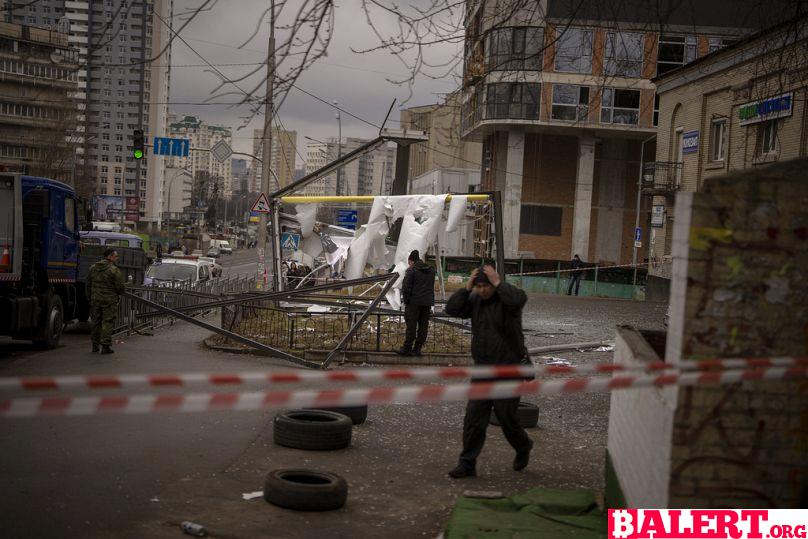World
Ukrainian Media Intelligence Firm Osavul Secures $3 Million Investment to Combat Disinformation
Ukrainian media intelligence firm Osavul has successfully secured a $3 million investment to enhance its efforts in combating disinformation. Discover how this funding will bolster their innovative strategies in the fight against fake news.

Ukrainian Media Intelligence Firm Osavul Secures Major Investment to Combat Disinformation

The Ukrainian company Osavul has recently made headlines by securing a significant investment of $3 million (approximately €2.78 million), marking it as the largest funding effort aimed at tackling disinformation in Europe. In its latest announcement, Osavul has revealed its three key European investors: 42CAP, a prominent German venture capital firm; u.ventures, a fund backed by the US government that co-finances projects in Ukraine and Moldova; and the SMRK Venture Capital Fund, which played a crucial role in their fundraising efforts last year.
Co-founder Dmytro Bilash, who initially had no intentions of entering the security domain, hails from a background in business and advertising. His journey took a dramatic turn in 2022 when Russia launched its full-scale invasion of Ukraine, leading to the destruction of his apartment in Kyiv by Russian missiles. This personal tragedy ignited a sense of urgency in Bilash to make a difference. A call for assistance from the Ukrainian government catalyzed the creation of Osavul—a media intelligence organization that harnesses artificial intelligence (AI) to identify and combat disinformation.
What started as a modest initiative in 2022 has rapidly evolved, now participating in EU-funded and NATO projects and attracting millions in funding. Osavul has established its headquarters in Delaware, USA, employing a diverse team of 28 specialists from around the globe, while over 500 analysts utilize the company’s data.
Insights from Dmytro Bilash on Disinformation Dynamics

Dmytro Bilash recently spoke with Euronews, sharing insights into the motivations behind Osavul’s inception and the pervasive nature of Russian disinformation.
Euronews: What motivated you to start Osavul?
Bilash: Our primary goal was to provide assistance during a time of crisis. The full-scale invasion fundamentally altered the lives of all Ukrainians. We offered our analytical expertise, and soon we were approached by government officials. The scale of the disinformation issue is enormous—no private company, whether in Europe or the USA, could effectively tackle this overwhelming flood of misinformation. Prior to the invasion, the scale of disinformation was relatively minor, but we recognized the urgent need to develop solutions to address this modern threat.
Euronews: How did your background in advertising transition into disinformation analysis?
Bilash: It was a challenging transition. We lacked a comprehensive solution to address these issues. However, we were adept at analyzing publicly available data, and we leveraged that expertise to create sophisticated technology to tackle disinformation.
Euronews: Can you explain your current working methodology?
Bilash: Our process involves several key steps. We gather data from various online sources, collecting over 10 million messages daily. Our AI analyzes this vast dataset to identify prevailing narratives, topics of discussion, and opinions expressed by media outlets, businesses, political entities, or influential figures. For instance, if Russia initiates a disinformation campaign in a European nation to disrupt elections or sow discord around economic issues, our system detects this and highlights the specific narratives employed in these attacks. We utilize three types of tools: open-source tools, commercial tools, and our proprietary tools.
Once the AI model filters the primary ideas and identifies false news stories, we focus on understanding the source of this misinformation. Is it propagated by a public institution, propaganda channels, or dubious websites? What impact does it have? Do these false narratives remain confined to one channel, or do they propagate further, creating an expansive echo chamber? We compile all this information and present it to decision-makers. Ultimately, our goal is to equip legislators and security institutions with the necessary insights to take action against misinformation, especially when laws are being violated.
Euronews: Can you provide an example of the primary narratives prevalent in Russian disinformation?
Bilash: It’s crucial to recognize that disinformation patterns are deeply influenced by cultural contexts and the specific audiences they target. These patterns are tailored to resonate with particular groups, whether they be young people, left- or right-leaning individuals, or Russian- or German-speaking communities. One prominent narrative in Russian disinformation is the portrayal of a weakening German economy. For instance, if a furniture company goes bankrupt—regardless of its actual existence—it is presented as a genuine case. In Germany, factual news is often manipulated or placed in misleading contexts to create the illusion that the German economy or state is faltering. Ultimately, the goal of these disinformation efforts in Germany is to undermine support for Ukraine.
Euronews: Why does Russia focus heavily on Germany for its disinformation campaigns?
Bilash: Several factors contribute to this strategy. First and foremost, Germany is a significant player on the global stage, being the largest economy in Europe. Additionally, the presence of a substantial Russian-speaking community in Germany facilitates the dissemination of disinformation. However, this element is not strictly necessary. Another key factor is the widespread use of Telegram, a messaging service that is more prevalent in Germany compared to other Western European nations. Much disinformation is propagated through platforms like X, TikTok, and Telegram—channels that often lack stringent oversight compared to Meta’s platforms like Facebook, Instagram, and WhatsApp. Furthermore, Russia can exploit pre-existing structures established prior to the war, leveraging the strong historical ties between Russia and Germany. In cultures that highly value freedom of expression, there tends to be a more fertile ground for disinformation.
Euronews: How can everyday individuals recognize disinformation?
Bilash: When I come across content on social media, I pay attention to my emotional responses. If a post or video evokes a strong emotional reaction, I become suspicious and ask myself why that is. Therefore, a key warning sign of fake news is the presence of intense emotional triggers. The second aspect to consider is the source of the information. Did I receive it from a trusted friend, or is it from a random account on X that typically shares lighthearted pet videos but suddenly presents a strong political stance? Sometimes, that distinction is enough to question the credibility of the information. Additionally, the current climate of disinformation underscores the importance of quality journalism, which can serve as a reliable resource for debunking and verifying false claims.
Euronews: Are there specific Russian disinformation narratives that are more prominently circulated within Ukraine?
Bilash: The situation in Ukraine differs somewhat from that in Europe or the rest of the world. Ukrainians have generally become much more discerning and vigilant. The strategies employed here are often closely tied to military developments. For example, Russia tends to exaggerate its ‘victories’ on the battlefield, presenting them as significant triumphs. If a village near the frontline is captured, it may no longer exist or have any residents, but Russian propaganda will herald it as a momentous victory for their armed forces. The aim of such campaigns is to disrupt the sense of unity among Ukrainians, both within the country and in the diaspora, thereby weakening mutual support.
Euronews: Is there a common strategy that Russia employs in its disinformation campaigns?
Bilash: Yes, when Russian propaganda discusses a nuclear threat, it often serves as a warning—either for the domestic audience or the international community. Take, for example, the bombing of the maternity hospital in Mariupol. This incident illustrates what we refer to as the “information alibi.” Prior to the attack, disinformation was spread suggesting that a Ukrainian battalion was stationed within the hospital. When the bombing occurred, the groundwork had already been laid, making it easier to propagate false narratives justifying the attack. Reporting the truth is straightforward: something happens, and you report it. However, if you’re attempting to disseminate a specific false narrative, you must prepare and maintain that narrative over time. It requires a systematic approach, akin to a machine that channels resources into spreading these deceptive stories.
World
Dominique Pelicot Testifies in Harrowing Rape Trial
Join us as Dominique Pelicot courageously testifies in a harrowing rape trial, shedding light on the complexities of trauma and justice. Her powerful story raises crucial questions about the legal system and the importance of support for survivors.

Dominique Pelicot Takes the Stand in Shocking Rape Trial
In a courtroom drama that has captivated France and garnered international attention, Dominique Pelicot, the man at the center of a harrowing rape trial, finally addressed the court. With tears streaming down his face, he recounted how his wife had been instrumental in helping him cope with a tumultuous past marked by trauma. He revealed that he had endured a sexual assault at the tender age of nine while hospitalized, and he also witnessed a gang rape during his teenage years while working as an apprentice electrician on a construction site.
“She didn’t deserve this, I acknowledge that,” Mr. Pelicot stated, his voice barely audible as he struggled to convey his emotions. The gravity of the situation weighed heavily on him, and the courtroom fell silent, straining to catch his every word.
Now 71 years old, Mr. Pelicot faces serious allegations of drugging his wife, Gisèle Pelicot, whom he has been married to for half a century, over a span of nearly ten years. Prosecutors contend that he used drugs to render her comatose, allowing him to rape her repeatedly. Furthermore, authorities allege that he went so far as to invite numerous men into their home, facilitating a nightmarish scenario where they, too, engaged in the assault of his wife.
Overall, 51 men, including Mr. Pelicot, are on trial concurrently, primarily facing charges related to the aggravated rape of Ms. Pelicot. Among them, one individual has already pleaded guilty to similar crimes, admitting to drugging his own wife to assault her and inviting Mr. Pelicot to partake in the horrific act while she was incapacitated.
Mr. Pelicot’s unexpected testimony came after a tumultuous start to the trial. Just a week in, he was stricken with severe health issues that forced him to miss four consecutive days in court. The head judge ultimately decided to postpone proceedings, as Mr. Pelicot was diagnosed with kidney stones, a kidney infection, and prostate complications, adding yet another layer of complexity to this already harrowing case.
World
Meta Bans Russian State Media Outlets from Social Media Platforms
Explore the implications of Meta’s decision to ban Russian state media outlets from its social media platforms. Understand the impact on information dissemination and the ongoing battle against misinformation in the digital landscape.

Meta Imposes Global Ban on Russian State Media Outlets
In a significant move, Meta Platforms, Inc., the parent company of Facebook, has announced the prohibition of Russian state media outlets, including RT (Russia Today) and Rossiya Segodnya, from all its social media platforms. The decision stems from the company’s concerns regarding the deceptive strategies employed by these media organizations to execute covert influence operations across the internet.
Meta made this announcement on Monday, emphasizing that the ban will be enforced worldwide across its various platforms, such as Instagram, WhatsApp, and Threads. The rollout of this ban is expected to take place over the coming days.
Statement from Meta
A spokesperson for Meta elaborated on the decision, stating, “After careful consideration, we have expanded our ongoing enforcement actions against Russian state media outlets. As a result, Rossiya Segodnya, RT, and other affiliated entities are now banned from our applications globally due to their involvement in foreign interference activities.”
For further insights into this development, watch the video in the player above.
World
Trump Recalls Alleged Assassination Attempt While Golfing
Explore Donald Trump’s chilling recollection of an alleged assassination attempt he experienced while enjoying a round of golf. Delve into the tense moments and his reflections on safety, fame, and the unpredictability of public life.

In a recent interview on the social media platform X, Republican presidential nominee Donald Trump recounted a harrowing incident he claims to have experienced while playing golf. Trump described how, during a peaceful Sunday morning round with friends, the tranquility of the day was abruptly shattered by the sound of gunfire in the air.
“It was a beautiful day, everything was just perfect,” Trump reflected. “Then all of a sudden, we heard shots being fired—probably around four or five in total.” He went on to explain that a Secret Service agent was the first to spot the suspect, who was allegedly armed with an AK-47, a powerful assault rifle.
“The agent saw the barrel of the weapon and immediately took action, returning fire at the barrel and aiming in the direction of the bushes,” Trump detailed. “I would have loved to have sunk that last putt, but we decided it was best to leave the scene promptly.”
Trump expressed his gratitude towards the agents and a vigilant civilian who aided in tracking down the suspect, who was eventually apprehended following a high-speed chase.
Suspect Faces Multiple Federal Gun Charges
The FBI has identified the suspect as Ryan Wesley Routh, accusing him of targeting Trump during his time at the golf club in West Palm Beach, Florida. According to an FBI report, Routh had allegedly hidden among the hedges of the golf course for an astonishing 12 hours. Authorities discovered an SKS-style assault rifle, a GoPro camera, and a bag of food at the scene.
The 58-year-old Routh is now facing two serious federal gun charges. If convicted on both counts, he could face a combined maximum sentence of 20 years in prison. Notably, neither of the charges is directly related to an assassination attempt. The first charge pertains to possessing a firearm despite a prior felony conviction, which carries a potential 15-year sentence, a fine of $250,000 (€225,000), and three years of supervised release.
The second charge involves possession of a firearm with an obliterated serial number, which could result in a five-year prison term, the same financial penalties, and also three years of supervised release. As the investigation continues, additional charges could be forthcoming.
While the motive behind Routh’s actions remains unclear, his digital footprint reveals strong political affiliations, particularly concerning issues surrounding Ukraine and China. Routh consistently expressed support for Ukraine across various social media platforms, even claiming to have orchestrated a recruitment scheme for international volunteers aiming to assist Ukraine in its fight against Russia’s invasion. This behavior has been denounced by Ukrainian soldiers and members of the International Legion, who disavowed Routh’s actions and motives.
-

 Business7 months ago
Business7 months agoThe Significance of Jackson Hole: A Central Banking Tradition
-

 Tech6 months ago
Tech6 months agoNew Leaks and Features About the Samsung Galaxy S25 Ultra
-

 Article9 months ago
Article9 months agoCreative Design Applications Developed with Artificial Intelligence
-

 Business6 months ago
Business6 months agoBhutan’s Strategic Investment in Bitcoin: A New Era for the Himalayan Kingdom
-

 Business8 months ago
Business8 months agoObituary: Dan Collins
-

 World6 months ago
World6 months agoThierry Breton Resigns: Impact on European Union Leadership
-

 Gaming6 months ago
Gaming6 months agoNew Details and Trailer Released for Dead Rising Deluxe Remaster
-

 Gaming6 months ago
Gaming6 months agoNew Details for Alan Wake 2 and PlayStation 5 Pro Announcement












